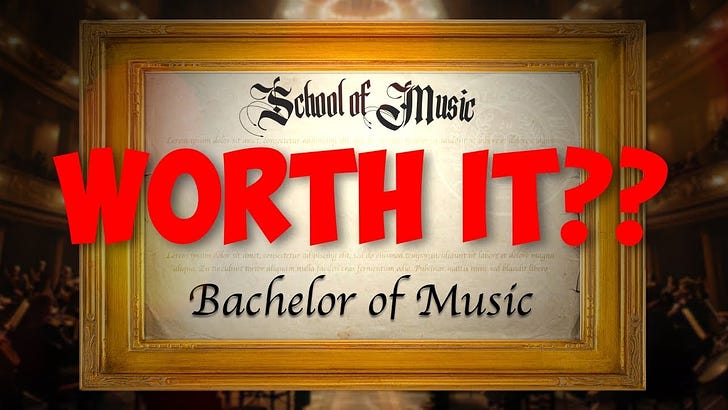Should You Go to Music School? My Experience & Insights
Key Factors That You Should Consider If You're In High School
Should You Go to Music School? My Experience & Insights
Are you debating going to music school? Do you wonder about the workload and what classes to expect? What are auditions like? Is going to music school worth the investment? What are the juicy ins and outs that no one talks about? These are some of the questions that I had when I was in high school and debating whether or not to go to music school.
My name is Carlos. I'm a composer and I recently graduated from music school with a composition degree. I'd like to share my experiences from these past four years. If you're debating whether or not to go to school for music—or any major, really—I hope these insights will be helpful as I walk you through my experiences year by year.
High School Music Journey
In high school, I was always involved in music, playing in the school band and teaching myself piano here and there. However, I never thought of it as a viable career option, much less becoming a composer. My journey towards music school began late in high school when I started experimenting with creating music through marching band. I would create marching band arrangements and other pieces, some of which my band director played during Friday night football games. Hearing my arrangements played live by real musicians was transformative for me.
This solidified my desire to explore composing further. I started creating my own original compositions for my school band, although they weren't the greatest, and I was misinformed about orchestration. However, it was fun to experiment and create music that mimicked the film scores of John Williams and John Powell.
My band director championed me to become a composer during my junior year. I started applying to competitions with my music, took an AP music theory class, and improved my skills. By my senior year, I was looking at colleges and deciding between a computer science degree and a music degree. I visited colleges, and by fall, I was interested in a school with a fantastic music composition teacher. I started preparing for auditions, which were more important than I initially thought.
Preparing for Music School Auditions
Music school auditions often require an instrumental or vocal audition, even for composers. Without private lesson instruction in high school, I had to navigate this process on my own, which was challenging. My repertoire consisted of common classical piano pieces, and I wasn't very proficient. I got into most of the schools I applied to, but some auditions didn't go well due to my lack of preparation.
Coursework and First-Year Struggles
Most first- and second-year music students take music theory, music history, ear training, and keyboarding skills classes. My high school music theory experience and keyboarding abilities were helpful, but many peers had to start from scratch. The pandemic added another layer of difficulty, hindering the typical college experience. One crucial tip is to ask for help if you're struggling—professors are there to support you.
Fun in Music School Beyond First Two Years
After the first two years, music school becomes more enjoyable as you delve into more specialized classes. In addition to coursework, being involved in ensembles is essential. I participated in the wind ensemble, choirs, percussion ensemble, and an athletic band. These experiences informed my writing style and were incredibly fun.
Excelling in Music School
To excel in music school, I developed professional skills while still a student. This included seeking opportunities outside of school, such as composing competitions, residencies, workshops, and conferences. Building an online presence through social media, a YouTube channel, and a personal website was also crucial. These efforts helped me build a broader network of musicians and contacts.
Importance of Networking and Mentorship
Networking is one of the most valuable aspects of music school. Building relationships with peers, professors, and patrons can lead to future opportunities. Having a mentor or advocate is also vital. My composition teacher was a significant influence, pushing me to improve and believe in myself.
Unexpected Benefits of Music School
The most unexpected benefit of music school is the network you build. This network of musicians, peers, and patrons is invaluable. A music degree itself may not guarantee a job, but the connections you make can lead to opportunities. Performance opportunities, especially with larger ensembles, are another significant advantage. These experiences help improve your orchestration skills and provide valuable recordings for your portfolio.
Personal Growth and Development
College is a formative experience that helps you develop adult skills, such as budgeting and independent living. Music school, in particular, helped me grow personally and professionally. I learned to be proactive, organized, and professional. Developing a tough skin and learning to balance various responsibilities were also crucial lessons.
Financial Advice for Music Students
If you decide to go to music school, try to avoid severe student debt. Look for scholarship opportunities, consider state schools, and stay in-state if possible. Arts degrees don't typically lead to high-paying jobs immediately, so managing your finances wisely is essential.
Conclusion: My Final Thoughts
Despite the uncertainties and challenges, going to music school was the best decision I ever made. If you have the self-discipline and passion for this field, it can be a transformative and rewarding experience. For aspiring composers, I recommend watching my video on "Five Practical Tips for Beginning Composers" to help you level up your skills.
Thank you so much for reading, and keep writing.




